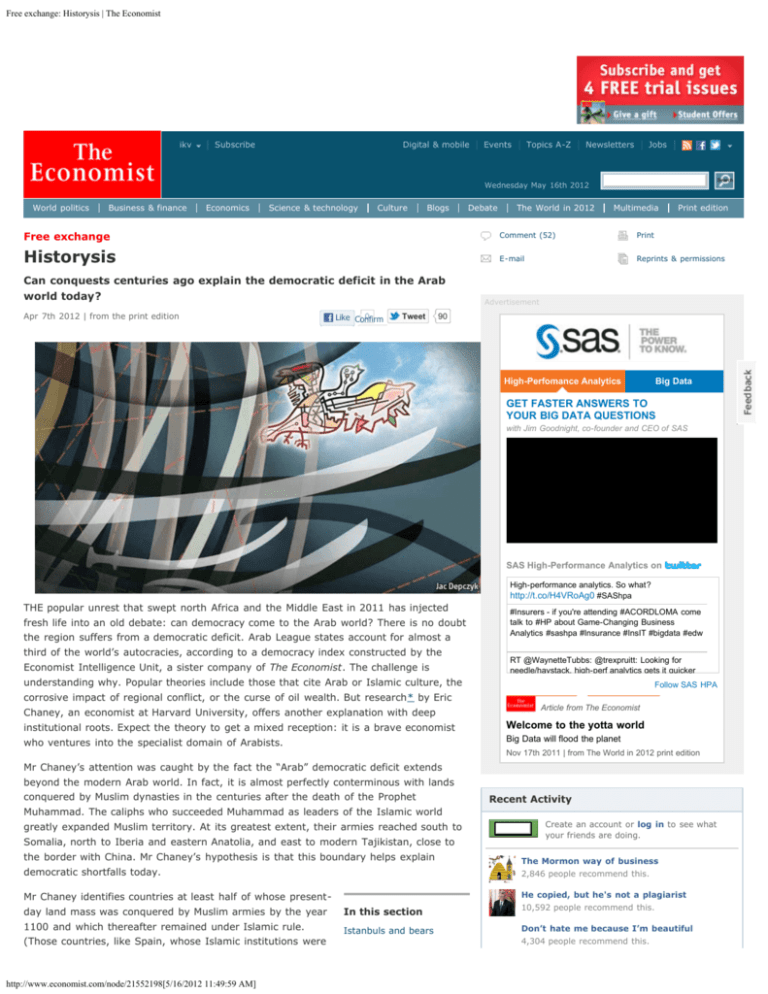
Free exchange: Historysis | The Economist
ikv
Subscribe
Digital & mobile
Events
Topics A-Z
Newsletters
Jobs
Search
Wednesday May 16th 2012
World politics
Business & finance
Economics
Science & technology
Culture
Blogs
Debate
The World in 2012
Multimedia
Print edition
Free exchange
Comment (52)
Print
Historysis
E-mail
Reprints & permissions
Can conquests centuries ago explain the democratic deficit in the Arab
world today?
Apr 7th 2012 | from the print edition
Like Confirm
Tweet
Advertisement
90
High-Perfomance Analytics
Big Data
GET FASTER ANSWERS TO
YOUR BIG DATA QUESTIONS
with Jim Goodnight, co-founder and CEO of SAS
SAS High-Performance Analytics on High-performance analytics. So what?
http://t.co/H4VRoAg0 #SAShpa
THE popular unrest that swept north Africa and the Middle East in 2011 has injected
fresh life into an old debate: can democracy come to the Arab world? There is no doubt
the region suffers from a democratic deficit. Arab League states account for almost a
third of the world’s autocracies, according to a democracy index constructed by the
Economist Intelligence Unit, a sister company of The Economist. The challenge is
#Insurers - if you're attending #ACORDLOMA come
talk to #HP about Game-Changing Business
Analytics #sashpa #Insurance #InsIT #bigdata #edw
RT @WaynetteTubbs: @trexpruitt: Looking for
needle/haystack, high-perf analytics gets it quicker
understanding why. Popular theories include those that cite Arab or Islamic culture, the
Follow SAS HPA
corrosive impact of regional conflict, or the curse of oil wealth. But research* by Eric
Article from The Economist
Chaney, an economist at Harvard University, offers another explanation with deep
institutional roots. Expect the theory to get a mixed reception: it is a brave economist
Welcome to the yotta world
who ventures into the specialist domain of Arabists.
Big Data will flood the planet
Nov 17th 2011 | from The World in 2012 print edition
Mr Chaney’s attention was caught by the fact the “Arab” democratic deficit extends
beyond the modern Arab world. In fact, it is almost perfectly conterminous with lands
conquered by Muslim dynasties in the centuries after the death of the Prophet
Muhammad. The caliphs who succeeded Muhammad as leaders of the Islamic world
greatly expanded Muslim territory. At its greatest extent, their armies reached south to
Somalia, north to Iberia and eastern Anatolia, and east to modern Tajikistan, close to
the border with China. Mr Chaney’s hypothesis is that this boundary helps explain
democratic shortfalls today.
Recent Activity
Sign Up
Create an account or log in to see what
your friends are doing.
The Mormon way of business
2,846 people recommend this.
He copied, but he's not a plagiarist
Mr Chaney identifies countries at least half of whose presentday land mass was conquered by Muslim armies by the year
In this section
10,592 people recommend this.
1100 and which thereafter remained under Islamic rule.
Istanbuls and bears
Don’t hate me because I’m beautiful
(Those countries, like Spain, whose Islamic institutions were
http://www.economist.com/node/21552198[5/16/2012 11:49:59 AM]
4,304 people recommend this.
Free exchange: Historysis | The Economist
soon displaced are excluded.) Mr Chaney then uses a
common measure of democratisation known as a “polity IV”
score to test various narratives of Arab political stagnation.
He normalises the score so that zero corresponds to
Clear and present danger
All that glisters
The Wenzhou experiment
Book-cooking guide
“strongly autocratic” institutions (like Saudi Arabia) while 1
From Brussels, with shove
represents a strong democracy (like America).
» Historysis
Islamic culture is a common scapegoat for the Arab
democratic deficit: some scholars single out the subservient
Marjorie Deane internships
Reprints
status of women or low levels of education for special
criticism. In aggregate, Muslim-majority countries are indeed about 0.3 polity points less
democratic than the rest of the world. But this overall gap is misleading. By dividing the
Muslim world into conquered countries and those spared conquest, Mr Chaney finds that
the democratic deficit remains for the former group but vanishes for the latter.
Conquered non-Arab states like Uzbekistan look like those in the Arab League whereas
non-conquered Muslim states like Albania and Indonesia do not.
Others have argued that the Arab-Israeli conflict is an obstacle to democratic transitions
in the Arab world. Yet Mr Chaney’s results persist when the Arab states closest to Israel
are excluded from his analysis (the results should change if a particular factor is
independently constricting democracy within the excluded group). Oil, too, is often
Herd at risk
1,275 people recommend this.
Facebook social plugin
Most commented
Most recommended
1. The euro crisis: Europe’s Achilles heel
2. Gay marriage: North Carolina begs the question
too
3. Suppressing dissent: The emperor does know
4. Should gay marriage be legal in America?
5. The euro in crisis: Groping towards Grexit
6. Gay marriage: Punctuated equilibrium
7. Obama endorses: Good for Obama, bad for gay
marriage
8. Israeli politics: Can Binyamin Netanyahu do a
somersault?
9. Euro-zone contagion: If Greece goes...
10. Renouncing citizenship: Did Eduardo Saverin do
anything wrong?
Over the past five days
faulted for strengthening anti-democratic regimes. Mr Chaney does indeed find evidence
Sponsored by
that oil wealth may retard democratic development but conquest continues to predict a
democratic deficit whether or not “fuel-endowed” countries are excluded from the
sample.
Mr Chaney speculates that conquest altered society, casting an autocratic shadow across
the centuries. Rulers came to rely on slave armies, freeing them from dependence on
civil institutions. Religious leaders co-operated with the army to design a system that
proved enduringly hostile to alternative centres of power. Lands brought to Islam by
conversion maintained some civil institutions. In unconquered Europe, meanwhile,
monarchs relied on the nobility to raise manpower and money for war. That gave the
nobles enough leverage to check absolutism. Across the conquered world civil society
remains institutionally impoverished, says Mr Chaney: the share of government in GDP
is seven percentage points higher in conquered states than in other Muslim states, for
example.
The importance of desert geography is another explanation for Arab autocracy. In a
2010 paper Stephen Haber of Stanford University and Victor Menaldo of the University
of Washington argue that desert institutions inhibit democracy. Moderate rainfall breeds
settled agriculture, they reckon, fostering urbanisation, trade and state-building. Arid
Latest blog posts
- All times are GMT
Global Zero: Fewer nukes, more security
From Clausewitz - 16 mins ago
France and Germany: The Frangela show
From Newsbook - 1 hour 4 mins ago
Daily chart: Big foot
From Graphic detail - 1 hour 40 mins ago
Romney and Obama: Truth in campaign advertising
From Democracy in America - 1 hour 51 mins ago
German football success: A league apart
From Game theory - 1 hour 51 mins ago
The euro crisis: Going, going, gone?
From Free exchange - 2 hours 40 mins ago
The debt crisis: Post-war reflections
From Buttonwood's notebook - 3 hours 13 mins ago
More from our blogs »
land undermined the development of the modern state, a necessary if not sufficient
condition for democratisation.
Products & events
There is a close relationship between desert terrain and conquest: camel-borne Arab
armies were well-equipped to travel and fight over desert. But Mr Chaney reckons that
the legacy of conquest is more important than rainfall. There is no statistically
significant relationship between aridity and autocracy outside the conquered world. Mr
Get e-mail newsletters
Subscribe to The Economist's free e-mail
newsletters and alerts.
Chaney does identify some conquered countries with rainfall levels similar to those of
unconquered Muslim states. Within this overlapping sample, the conquest states again
align with the democratic deficit. Iran is autocratic; Mongolia, with a similar level of
rainfall, is not.
No slave to history
Even if Mr Chaney is right, history is not destiny: the Arab world can escape its
autocratic past. Education levels in Arab-conquered countries have nearly converged to
those in the non-conquest Muslim world. This may drive popular dissatisfaction with
limited economic opportunities and increase pressure for political change. But a longstanding poverty of civil institutions is nonetheless an obstacle to democratic transition.
Change may be in the offing, but the past must be uprooted first.
http://www.economist.com/node/21552198[5/16/2012 11:49:59 AM]
Follow The Economist on Twitter
Subscribe to The Economist's latest article
postings on Twitter
Follow The Economist on Facebook
See a selection of The Economist's articles,
events, topical videos and debates on Facebook.
Free exchange: Historysis | The Economist
* “Democratic Change in the Arab World, Past and Present” by Eric Chaney. Prepared for the
Brookings Panel on Economic Activity, March 2012
Economist.com/blogs/freeexchange
from the print edition | Finance and economics
Recommend
47
Like Confirm
Tweet
18
90
11
Share
View all comments (52)
Classified ads
About The Economist
Media directory
Advertising info
Staff books
Copyright © The Economist Newspaper Limited 2012. All rights reserved.
http://www.economist.com/node/21552198[5/16/2012 11:49:59 AM]
Career opportunities
Legal disclaimer
Subscribe
Accessibility
Contact us
Privacy policy
Site index
Terms of use
[+] Site Feedback
Help






